Once Insurance Company Confirms Existence Of Policy After Investigating Accident, Withdrawal Of Such Stand Subsequently Is Not Permitted: Madras HC
Finding that the petitioner (Insurance company) instead of safeguarding the voice of voiceless, and instead of helping the helpless claimants, has put them under great torment and quandary, the Madras High Court held that the claimants were compelled to wait almost for more than 17 years to get the fruits of the award, simply because of the conduct of the petitioner.
Therefore, the High Court refused to entertain the petition seeking to set aside the fair and decretal order passed by the Motor Accident Claims Tribunal (MACT).
A Single Judge Bench of Justice C. Kuumarappan observed that “according to the insurance company's averments, they probablised the fraud, based upon the alleged insurance policy number which said is to have been referred in the M.V.I. report. But they came up with the theory of fraud, after the period of 4 years. As a matter of fact, there is no nexus between the claimants and for reference of policy number in M.V.I. report. Furthermore, as rightly observed by the learned trial Judge, when the petitioner themselves have filed a counter statement after investigating the accident, and confirmed the existence of policy, withdrawing such stand subsequently will not augur well to the insurance company except to put the claimants in trepediation”.
Advocate J.S. Murali appeared for the Petitioner, whereas Advocate T. Selvakumaran appeared for the Respondent.
The brief facts of the case were that the respondent had filed a claim petition in respect of the death of one Aurlanandhu in an accident by Mahindra Van. The respondents are the wife, children, and mother of the deceased. This was opposed by the petitioner (insurance company) by filing a counter statement against the respondents to prove the nature of the accident as the petitioner was directed to pay a sum of Rs.3,17,0000/- with interest by the MACT. Later, after the lapse of almost four years, the Insurance Company filed an application to recall the award passed by the Tribunal under Section 151 CPC on the ground of alleged fraud committed by the respondents in respect of insurance policy number of the vehicle.
After considering the submission, the Bench observed that the respondents have not committed any fraud.
The Bench found that even according to the affidavit of the petitioner, they were not sure that the vehicle involved in the accident did not have a policy at the relevant point in time.
Going further, the Bench noted that the insurance company had deliberately not taken any steps to get the copy of the policy from the owner of the vehicle.
The Bench also stated that “As per the Insurance Act, 1938, under Section 64 VB, unless the premium is received no coverage would exist. Therefore, the contention of the insurance company about the fraud has no basis and rests in obscurity. For which they blame their software.”
The High Court clarified that the concept of insurance coverage exists for a long time even before the advent of computer, and there exists a well-defined procedure to verify the coverage of a vehicle.
Therefore, their elusive defence of fraud would in no way be helpful to anyone, except to cause despair and consternation to the claimants, added the Court.
Accordingly, the High Court dismissed the petition and directed the insurance company to deposit the entire award amount within a period of four weeks from the date of receipt of a copy of this order, if not deposited so far.
Cause Title: National Insurance Company Limited v. A. Savariammal and Ors.
Click here to read/download the Order












